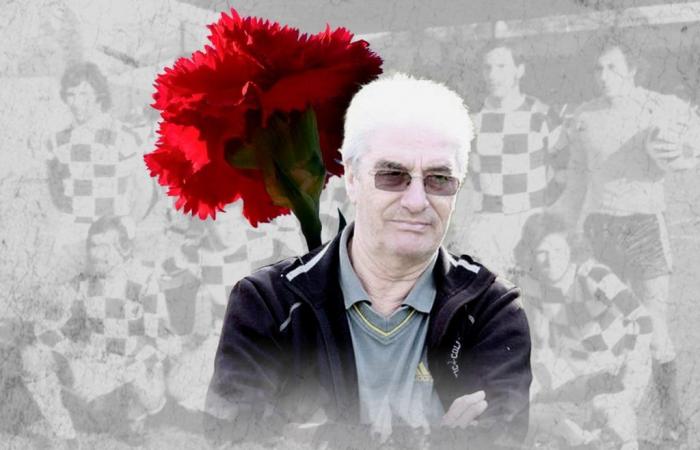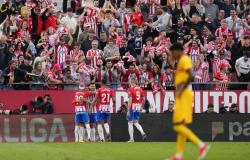The Estado Novo falls, the people take to the streets, the Carnation Revolution severs the oldest dictatorship in Europe. Two days later, April 27, 1974, the Portuguese Cup was played at Bessa and Tapadinha, at the same time. First games in Democracy, strange sensations, the crowd still feeling ground.
Acácio Casimiro enter football history this afternoon. He is the scorer of the first two goals after the 25th of April, in the 12th and 33rd minutes of the match. Boavista-Famalicão. A vigorous, ambidextrous midfielder, he spent five years playing chess and won two Portuguese Cups. Half a century later, he sits down to talk to the zero zero. A Lord, in capital letters, 75 years old and with many lives to count.
zerozero – Acácio Casimiro scored two goals on April 27th, but first there is the sacramental question: where were you on April 25th, 1974?
Acácio Casimiro – Well, I woke up early to go train to Bessa. I lived in Espinho, I always listened to the news in the morning and I heard everything in the kitchen. They spoke of a coup d’état and the military march on Lisbon. There was nothing on television, there was no music on the radio, just news about the military coup. It was all strange to me, I have to be honest. Few of us were politicized, there weren’t many people in football who were aware of the injustices that were raging in Portugal. The most effervescent, in a good way, was the António Alberto Teixeira, now owner of Ibersol. He spoke to us a lot, he belonged to the UDP and enlightened us. I even think that he is now from the CDS, he has come around completely (laughs).
zz – Did the Boavista locker room follow António Alberto’s teachings?
AC – All except one, the There. He was from Amarante, from a wealthy family and at the time, as a joke, António Alberto called him a fascist. But we were so unprepared and ignorant that we just laughed about it.
Acácio Casimiro
zz – Still, did you hit the road to go to training in Porto?
AC – Yes, I went to Porto in my car and things could have gone wrong. But I had a feeling that something bad could happen and I took precautions.
zz – What did Acácio do?
zz – I don’t know whose soul it was, but I went to the wardrobe and picked up my green leather army coat. I had gotten out of the military in October ’73, after 40 months there. He was responsible for feeding 800 men daily, before they embarked for Ultramar. I never studied as much as I did in the army. It had 14 subjects. I became ensign and was even mobilized to Angola.
zz – Were you at Ultramar?
AC – No, no, I was very lucky and got away with it. I was stationed in the Gaia barracks and lived in Espinho. A colleague of mine lived in Gaia and was stationed in Espinho. We made an exchange and put in the papers to change barracks. Before that happened, my name appeared on the lists for Angola. I explained to my colleague that we could no longer make the exchange and he got really upset. Well, the truth is that he needed money and was willing to go to Angola in my place.
zz – And were they able to reverse the decision?
AC – It wasn’t simple, because there was still another soldier involved in the noise, who also wanted to exchange with him. That was almost an auction. In summary: I paid 20 contos [20 mil escudos – 100 euros] to escape the war. My colleague went to Angola, it’s impressive. My mother was already crying. She was all happy when she told her that she had managed to get me out of the war.
zz – How much did you earn at SC Espinho monthly at that time?
AC – 1500 shields. And he was one of the best paid. 20 thousand escudos was a small fortune. At that time, we are talking about 1970, FC Porto had already tried to sign me and Boavista had also offered 30 thousand escudos and four footballers to SC Espinho for my services.
zz – Didn’t want to play for FC Porto?
AC – I wanted to, but the club didn’t have money for me and I ended up at Boavista. Mr. Pinto de Sousa, vice-president of the club, went to Espinho and provided money from his own company, Fapobol, to hire me. Well, it was a very complicated situation, because it involved football, clubs and then the troops and going to Angola. And also a kidnapping.
zz – A kidnapping?
AC – FC Porto kidnapped me and put me in the Hotel Nave, in Constitution, for 15 days. But he couldn’t find the money to buy me. That was when Valentim Loureiro appeared in Espinho. I went to Boavista to earn seven contos a month and received 20 contos as ‘gloves’. I used these 20 contos to pay for my escape from the war. Because, in the meantime, Espinho had advanced me the money. Everything ended well and I signed for Boavista.
zz – We ended up not completing your April 25th. He took the troop’s coat and then the trip went well?
AC – I was intercepted by people from Afurada on Ponte da Arrábida. And that’s why I say that my military jacket saved me. These guys, when they saw me wearing a coat, thought I was from the army and let me pass. They were searching all the cars and they didn’t do anything to me. And there I went to Bessa. At night, when I returned to Espinho, the streets were full of people, everyone celebrating. Only then did I celebrate at ease, with friends and family. I looked for more information, because very little was known. It has nothing to do with today. Look, as a joke, I often say that on that day all the fascists disappeared. Suddenly, no one was a fascist in Portugal.
«Bessa fans tested the patience of the military»
zz – Let’s go back to April 27th. On the second day in Democracy there was even a football game.
AC – But it wasn’t supposed to be. There were no police, nothing. But in Boavista we had a man who was Captain Valentim Loureiro, nowadays known as Major, and who had been a colleague of Otelo Saraiva de Carvalho in the Pupils of the Army. Well, after a phone call between the two of them, Othello guaranteed that our game would go ahead. ‘There is no police, but I send the army there‘. The game took place and thankfully.
zz – Were you aware at the time that you made history by being the first man to score after the 25th of April?
AC – I didn’t, honestly I didn’t. Anything. It was only very recently that I found out about it, through journalists.
zz – Let’s talk about these historic goals, the first for democratic Portugal. Do you remember both?
| Accio Casimiro 2 official titles |
AC – I remember the first one most of all. O savior he made an arcing cross, on the left, the ball flew over the area and I was in the corner on the other side. I came in, let the ball hit once and hit it. It came in from the opposite angle, it was a great goal. I remember the second one less well, but I know it was off the top of my head.
zz – Was the policing of this historic Boavista-Famalicão area carried out by the military?
AC – Exactly. There were six enlisted men and a sergeant. Or lieutenant, now I’m in doubt. They came from the Constitution headquarters. We were all scared, I can’t hide it. I’m not old enough to be strong anymore. Look carefully: we went to a stadium full of people, just 48 hours after the day of the Carnation Revolution. We still didn’t know exactly how the population would react to this change. We were blurred, that’s the truth.
zz – How was the atmosphere at Bessa on April 27th?
AC – Our home games took place on Saturdays. The stadium was always full, at the time it was said that my Boavista was the team that played the best in Portugal, both with the coach Aymore Moreira as, next, with the José Maria Pedroto. We even won two Portuguese Cups, one against Benfica in 1975 and another against Vitória de Guimarães in 1976. We had fantastic teams with Salvador, Mané, Mário João, not to mention me (laughs). That afternoon, Boavista fans came to the lines of play, almost onto the field. They wanted to test the patience of the military. They climbed over the fence and saw the game right there. They had to dodge me when I was going to make throw-ins.
«I went stupidly to my grandparents’ house on vacation»
zz – The chronicles of the time praised his left foot a lot.
AC – The law was no worse. I was ambidextrous, I could shoot easily with my right or left. But he played more as a left midfielder and therefore used his left foot more, it’s true. And he was smart, I think. In fact, I started my coaching career when Mário Wilson left Boavista and João Alves took over the team. He called me and told me to be his right-hand man and help him as much as possible. Interestingly, after April 25th Boavista’s growth was galloping.
zz – Did you feel this change within the club?
AC – Very very. And in everything: field conditions, salaries, even the organization of trips to European games. Just the other day I was asked who was the best footballer I played against and I replied ‘Kenny Dalglish‘. He still played for Celtic in Glasgow. In fact, we were eliminated by the Scots and eliminated very badly. The referee was having a bad day.
zz – Where was Acácio born?
AC – In Mogadouro, Trás-os-Montes. And when I was ten days old I moved to Bragança and two years later to Macedo de Cavaleiros. When I was four, I went to Duas Igrejas, in Miranda do Douro, and spent seven months in Pocinho, near Régua. When I was six years old, I went to live in Espinho and stayed there until 1992, when I went to work for Estrela da Amadora. My father was a railway worker and we moved house whenever he was promoted. Today I live in Senhora da Hora, in Matosinhos.
zz – What memories do you have of pre-revolution times?
AC – Very few from Trás-os-Montes. I left there when I was little and then only went back there on vacation, to visit my grandparents. We left on the train and I went stupidly to their house, with my father on foot. Poverty was atrocious, no one imagines. My family already had some conditions, because my father had a beautiful profession, but what surrounded us was very bad.
zz – Does football only appear in Espinho?
AC – Exactly, at 12 years old. In one of the youth seasons I scored 34 goals and at 17 I reached the senior ranks, thanks to coach Artur Quaresma.
zz – What were conditions like for professional footballers before April 25th?
AC – Calling that professionalism… only with good will. I liked to understand things and I was secretary of the Players’ Union for five years, when the recently deceased Artur Jorge was president. It was during our period that the sad Option Law ended. We were completely in the hands of the clubs, we couldn’t decide anything. It was one of the demands after April 25th and we put an end to it. We now have some labor laws, something that didn’t exist before. These young people today need to read this and realize how lucky they are. And still good.






